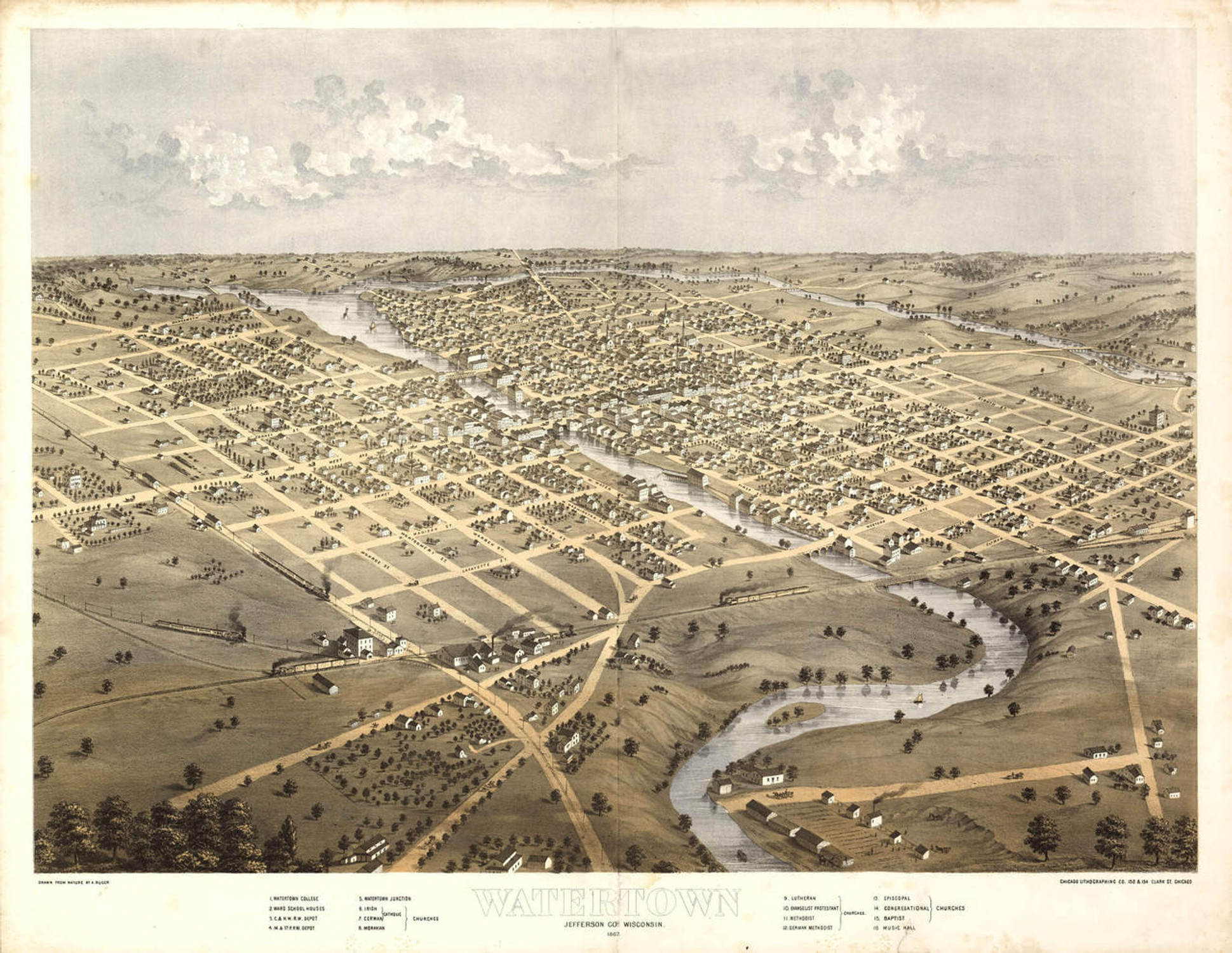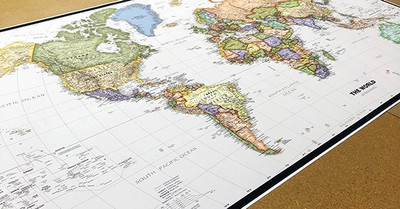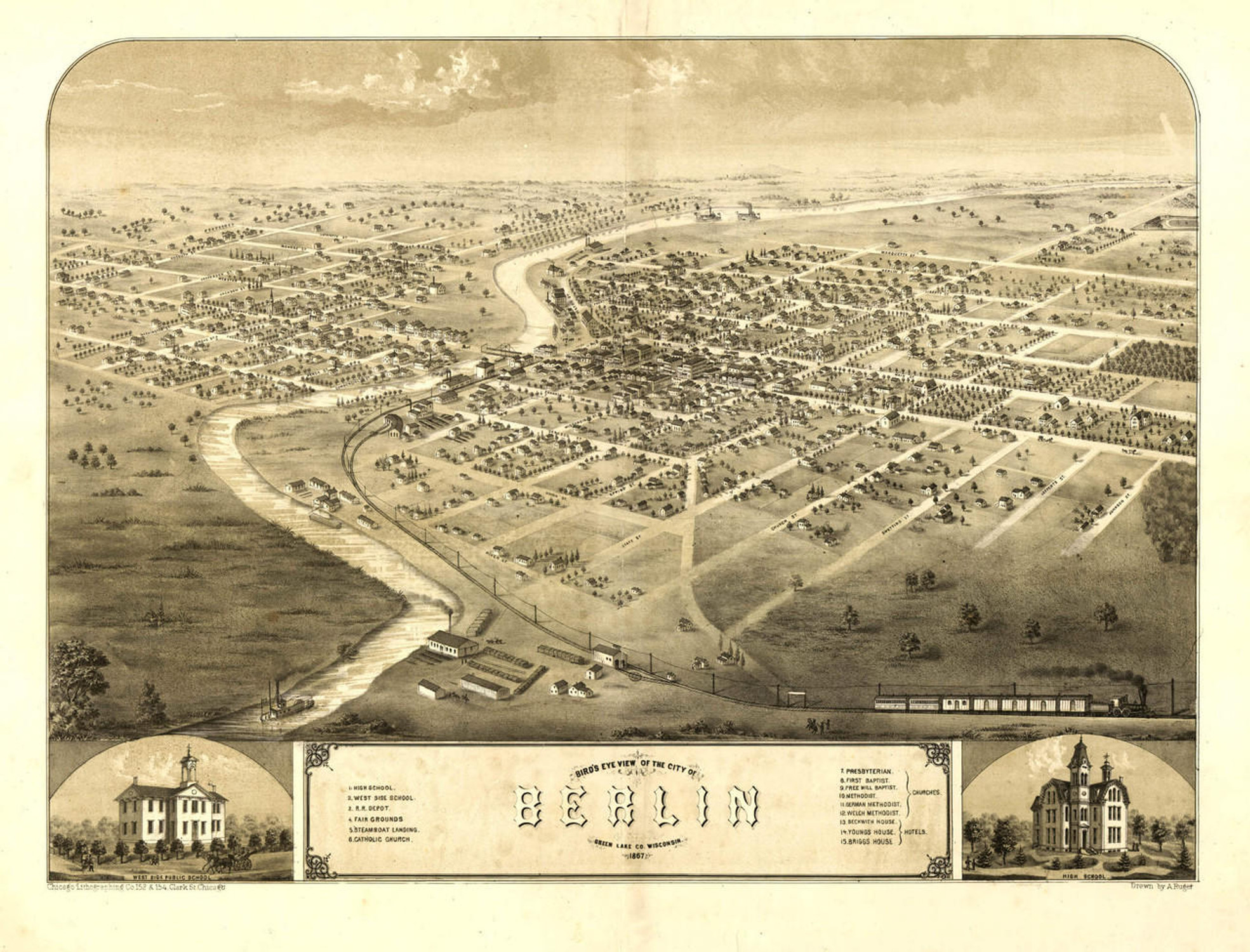
Historic Map - Ripon, WI - 1867
Description
Birds eye view of the city of Ripon, Fond du Lac Co., Wisconsin 1867. Drawn by A. Ruger.
Historic panoramic view map of Ripon, Wisconsin, drawn by Albert Ruger in 1867, reprint. Beautiful inset illustrations are featured across the lower margin of the map, the central one being an illustration of Ripon College.
The following residences are also featured as detailed illustrations:
- Residence of Hon. A. M. Skeels.
- Residence of W. A. Starr, Esq.
- Residence of R. Catlin, Esq.
- Residence of Dr. F. M. Hubbard.
Features numbered references to the following locations:
- Ripon College.
- School House.
- Cemetery.
- Rail Road Depot.
- Fair Ground.
- Congregational Church.
- Methodist Church.
- Universalist Church.
- Baptist Church.
- Episcopal Church.
- Lutheran Church.
- Catholic Church.
- Mapes House Hotel.
- American House Hotel.
- National House Hotel.
Founded by former New York steamboat captain, David P. Mapes in 1849, the city of Ripon was the site of the first meeting of the group that would become the Republican Party in 1854. Just a few days before this significant meeting, another event was to occur that would also impact the town of Ripon by placing the United States Fugitive Slave Act under challenge. Joshua Glover, a runaway slave from Missouri, was captured in July, 1854, near Racine, Wisconsin and imprisoned there while awaiting his return to Missouri. Sherman W. Booth, the editor of Milwaukee's "Free Democrat" newspaper, and an abolitionist, called for a protest that ultimately led to Glover's being set free through mob violence. Booth was held accountable and arrested. What follows is a first-hand account written by O. H. La Grange, a Ripon resident who helped break Sherman Booth out of jail in 1860.
"THE BOOTH WAR IN RIPON"
Personal Reminscences by O. H. La Grange.
In June, 1860, Edward Daniels suggested to me that Sherman M. Booth, who was confined in the Custom House at Milwaukee under sentence of imprisonment for participating in the rescue of fugitive slave Glover, ought to be released. On the 3rd of July following, I met Daniels and others at Milwaukee, but our plans for the release became known and a squad of U. S. Marines was brought to the Custom House to guard the prisoner. It was then decided that I alone should remain in Milwaukee and make a farcical demonstration to mislead the guards, and thus prepare for the success of a future attempt to release their prisoner. Early on the morning of the 4th I went under the window of the second story room, where Booth was confined, and called out to him to throw down the manuscript of his speech with a cord, and as I could not read his hand-writing, his wife read it aloud to me and I copied it.
About noon I conducted Mrs. Booth and her friend, Madam Aneke, to a shelter near where a crowd had assembled under Booth's window to hear his fourth of July oration, which had been advertised in his paper.
The uniforms of Marines showed at the barred window.
I called upon Judge Byron Paine, (of the Supreme Court), whom I saw in the audience, to read the manuscript, which I held in my hand. He replied: "Read it yourself." I then nominated him for President, and Fredericks for Secretary of this meeting, declared them elected, and after a few words of introduction, read Booth's speech.
After the reading I made some incoherent remarks about releasing the prisoner, looked for a ladder, and assured the people that the Marines would not resist us.
I had made the feint as agreed, and a good man, named Hargrave, from Ripon, and some others, thought I was in earnest, and would have followed had I lead. They probably felt humiliated by my inconsequential conduct but I was satisfied, when the newspapers ridiculed me next morning that I had misled them and the guards.
On the fourth of August following, Prof. Daniels, Irving Bean, Mr. Morton, Mr. Fredericks, Mr. Willits, a guard at the States Prison, and another guard whose name I have forgotten, and the writer were in front of the Custom House at noon, to accomplish what we had postponed. Some persons who had been expected were not present.
Precisely at 12 o'clock noon, Irving Bean, who had carried some jelly to Booth, came down and stood on the step of the Custom House. He drew his handkerchief once across his lips to indicate that only one Deputy Marshal was on guard over the prisoner, his companion having gone to dinner. Bean passed down as we ran up the stairs. A blank card like those on which the Marshal wrote his passes, was handed to the Deputy, who dropped the butt of his musket between his feet, as he turned the card over, his wrists were seized and he was pushed backwards into a corner of the hall. His musket fell upon the floor, and I asked: "Will you be very quiet; or shall we gag you?" He replied: "I'm in your power, gentlemen. Do with me as you please."
Morton unlocked the door (with a key made from an impression of the lock taken in softened bread crumbs), and called out: "Come out here, Booth. You're wanted."
In turning the Deputy around to lead him to the door, I saw that one of our party had a navy revolver cocked in his hand, and begged him to put it up lest it go off and hurt somebody. It probably influenced the amicable surrender of Deputy Burke, who was led to the door, pushed through it and locked in. He opened the window, walked on the coping at the risk of his life to another window and gave the alarm. (He retained his place many years, and had a son in the U. S. Navy when I met him in Milwaukee about 1884.)
Booth came out wearing the fur cap he had worn when confined the winter before, and carrying a huge bouquet.
The Postoffice was in the Custom House and the Postmaster (I think his name was Stover), had a lot of loaded muskets on the first floor, with which it was intended to arm employees deputized as marshals to guard the prisoner. He ran to the door calling out: "What's all this? What's all this?"
I slid down the hand-rail ahead of our party, laid my hand on his shoulder, said: "It's all right, -- It's all right," but was ready to throw him down the steps if he gave any orders.
In five minutes we were on the street with five hundred excited people around us, going to the house of Booth's brother-in-law, a hatter named Saulsman. After a hasty dinner it was decided that Booth with the two prison guards and myself, should drive to a railway station, two or three miles distant, and take the car to Waupun or Ripon. We passed out of Saulsman's house through a back yard to the stable, while the U. S. Marshal, Jehu H. Lewis attempted to summon the Posse Comitatus from the crowd in front of the house, to re-arrest the prisoner. Professor Daniels stood on the porch and argued with the Marshal, while the crowd made fun of him, and before we left the stable word came that the Montgomery Guard had been ordered to assist the Marshal.
We reached the railway station just before the train, took the car and proceeded without question to Horicon. Here, Satterlee Clark, a former neighbor and friend, came into the car while the train stopped and told us he had been telegraphed from Milwaukee to make an arrest, and that he could undoubtedly have brought force enough to do so, but, that he had declined the service because he "thought it the best thing that could happen to have Booth get away." I told him jestingly, that no one would dispute his courage, and that in this case his prudence deserved commendation. We reached Waupun without further incident. I have little knowledge of many things which happened in the matter afterwards.
I went to my home, six miles from Ripon, and remained there until called on Sunday to attend a large meeting at the grove near the village, where I marched at the head of a squad of men, armed with a lead pencil, and listened to much aimless oratory.
I thought that the object of the rescue of Booth from punishment by Federal authority, had been accomplished by notice thus given, that our people would not submit to the enforcement of the fugitive slave law in our section. Besides, I lost interest in Booth personally, because he advised me to ambush the Deputy Marshals who were seeking to arrest me, and kill the, instead (as he put it), of constantly exposing myself to be killed by them. I had not the kind of courage of which the fiery editor suspected me.
Afterwards, when the deputies came to arrest participants in the rescue, not being willing to be arrested, or able to bear the expense of a trial, I was driven by George W. Carter and his brother James, in the night, to the home of my friend and fellow student, A. H. Lewis, (now a learned and eloquent Divine of Plainfield, N. J.) and went from there to the home of Horatio B. Baker at Waupaca, where we spent a couple of weeks together. Alvin E. Bovay loaned me twenty dollars with which to journey and return, sent by the had of G. W. Carter.
When Baker first came to my home, after the trouble, he read me a sharp lecture for having "violated the law". And then, when I took my shot-gun, and told him that "I expected the marshals in half an hour, and was going to pass the night in a cornfield," he caught up another gun, and said, "well you're in the scrape, of course I'm going to stand by you." Baker was 1st Sergeant of the "Ripon Rifles" under my command when the war broke out, and quit the service a Brevet Lt. Col. of the 4th Regiment.
George W. Carter, with whom I had studied at Brockway and at the State University, was my staunch and intimate friend, and rendered me much kind service at this time. He was quiet in manner, but clear headed and positive in action, and as reliable as the sun. He was a member of the "Ripon Rifles", and was almost fatally wounded, leading our old Company in the charge at Port Hudson. His wound took him out of service as Major, and no volunteer from Wisconsin has deserved better in either military or civil life.
After my return from Waupaca, I had been harvesting some wheat on a lot that I owned near Ripon, and having laid aside my revolver on account of the hear, I walked through the town to the postoffice, and then through Ceresco towards my home, six miles away on the prairie. Near Dakin's farm, Mr. Thatcher, riding rapidly on a bare-backed colt, overtook me and called out --"they're coming, they're coming, the marshals are after you, two hack loads of them, with shotguns!"
I said, "Well, uncle Thatcher, you ride slowly back, and when you meet the, tell them I am armed, and they would better be cautious." When he was out of sight I stepped over the rail fence into the field, and sat down behind a thick bunch of blackberry bushes, and saw the Deputy Marshals pass. I recognized among them Ned Stallard, a butcher; and Wentworth, a cabinet-maker, of Ripon; and heard one of them assure another that he thought La Grange was "just fool enough to fight." When they had passed out of sight, I ran across the fields to the house of my uncle, Andrew Cullings, and in company with my brother Wallace, ran to my home. We stopped behind a knoll in the field of William Wood, about one hundred yards in front of my mother's house; we saw two hacks through the dusk, and heard the deputies conversing in the road between us and the house.
My brother lift me and went directly to the house. As he entered the gate he was arrested by two deputies, who sprang up from behind the rose bushes in the yard, and covered him with their shot-guns. He held the gate-pin in his hand, and whistled loudly as though calling a dog. One of the deputies called out, --"look out, he's got a pistol," and the other said, --"stop whistling for your dog." My brother told them, laughing, that he couldn't shoot them with a gate-pin," and that "if he had a dog he wouldn't let him bite a Deputy Marshal, for fear it might kill the dog."
They went into the house, and my brother told them he "was hungry and wanted some supper." My mother then invited them to "stop and have a cup of tea." By this time they found that they had the wrong man; and seemed in haste to go. They released my brother, who went to the door and continued whistling; and despite his assurance and my mother's, that I would soon be there, they hurriedly drove away.
While this was passing, I ran to Wood's barn, where a number of threshers were sleeping, and asked them to go with me, and interview the deputies. When we reached the house they had gone.
I sent my brother on horse-back to Ripon, with the following note, (which I copy from memory,) to be printed in Allen's paper, which would be published next day.
"My compliments to Messrs. Wentworth, Stallard and others, deputy marshals, and assurance of regrets that I was unavoidably absent when they called at my house last evening, while I had gone to invite some friends with ornaments to attend the merry-making. I shall be at the postoffice in Ripon, at twelve o'clock, noon, on Saturday next, and shall be happy to meet my friends. (signed) O. H. La Grange."
The card was printed, and may probably be found in the old files of Allen's paper, if they are extant."
Materials
Archive Paper

Premium fine art paper that provides accurate color reproduction with high-contrast, high-resolution print output and maximum image permanence. A high-quality print ready for framing.
More
- Museum quality paper for high-quality fine art.
- Ultra smooth, neutral white matte finish.
- Heavy-weight 230 gsm, 9.5 mil thickness.
- Printed with pigment inks for longer print life and enhanced fade resistance.
- Pigment based Canon LUCIA inks provide smooth tones and rich colors in fine, precise detail.

Made In The USA

School Purchase Orders





